

The Oral Microbiome–Nitric Oxide Connection
When you think about high blood pressure, chances are your dentist or oral health isn’t the first thing that comes to mind.
But what if I told you that the bacteria in your mouth may play a critical role in how well your blood pressure is regulated?
This emerging research is changing the way we think about hypertension—and it’s revealing that supporting your oral microbiome is just as important as managing your stress levels, diet, or medications.
Let’s explore this fascinating new connection between your mouth, nitric oxide, and blood pressure—and why it matters more than ever:
High blood pressure (hypertension) is a global health crisis.
- 1 in 3 American adults has hypertension.
- It increases the risk of heart attack, stroke, kidney disease, and dementia
- And despite all the medications available, only about half of those treated successfully manage it
Clearly, something is missing from the conventional approach—and the answer may be hiding in plain sight: your mouth.
Enter the Oral Microbiome:
Your oral microbiome is a thriving community of over 700 different species of bacteria living on your tongue, gums, teeth, and tonsils. Your oral bacteria help produce nitric oxide (NO)—a vasodiodilator that helps your blood vessels relax and dilate, thus reducing blood pressure.
Why Does Nitric Oxide Matter?
Nitric oxide helps your heart not have to work as hard. It keeps your arteries flexible, improves blood flow, and lowers resistance in your circulatory system.
Here’s where your mouth comes in:
When you eat nitrate-rich foods like beets, spinach, and arugula, your body depends on oral bacteria to convert inorganic nitrate → nitrite → nitric oxide.
Without these bacteria, this essential process slows down or stops—leading to higher blood pressure.
The Hidden Danger: Mouthwash & Antibiotics
You might be surprised to learn that something as simple as using an antiseptic mouthwash could disrupt your nitric oxide production.
Why? Because mouthwash kills the very bacteria responsible for this conversion.
In fact, studies have shown that using antiseptic mouthwash can increase blood pressure within just days—and long-term use may have more serious cardiovascular consequences.
Similarly, overuse of antibiotics can reduce these helpful microbes, and delay their recolonization, affecting not only your gut but also your heart health.
A New Therapeutic Target for Hypertension
Research now shows that allowing recolonization of nitrate-reducing oral bacteria can help restore nitric oxide production—and naturally lower blood pressure.
This has led to a new paradigm in cardiovascular medicine:
Supporting oral health is not just about preventing cavities or gum disease—it's also about protecting your heart and circulation.
How to Support Your Oral Microbiome for Heart Health
Here are a few practical ways to protect your oral bacteria and promote nitric oxide production:
- Avoid antiseptic mouthwash.
- Eat nitrate-rich foods such as leafy greens, beets, and celery.
- Use oral microbiome-safe toothpaste and rinses (fluoride- and SLS-free)
- Practice nasal breathing to support nitric oxide production in the sinuses and avoid mouth breathing at night.
- Tongue scrape gently to reduce buildup without destroying helpful microbes
- Limit antibiotic use to only when needed—and support recolonization after with probiotics.
Functional Insight: It’s All Connected
As a registered dental hygienist and functional medicine practitioner, I’ve seen firsthand how oral health impacts whole-body systems—from digestion to detox, to immunity, and now, cardiovascular health.
Understanding and supporting the mouth-heart connection can transform the way we approach chronic disease—and empower individuals to take their healing into their own hands.
Final Thought
We can no longer afford to separate the mouth from the rest of the body.
Your oral microbiome plays a vital role in regulating blood pressure and protecting your heart. It’s time we start treating oral care as preventive cardiovascular care.
Your oral microbiome plays a vital role in regulating blood pressure and protecting your heart. It’s time we start treating oral care as preventive cardiovascular care.
Want to Learn More?
Book a free discovery call- this is a no pressure call. I would like to hear your story and tell you how functional wellness coaching can help you.
- https://pubmed.ncbi.nlm.nih.gov/28353075/











